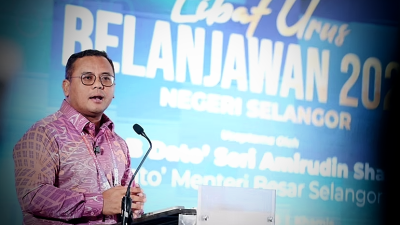
In today’s rapidly evolving AI landscape, imbuing systems with ethical principles is central to both technological and social discourse.
Recently, Malaysia’s Prime Minister Anwar Ibrahim urged AI developers to integrate Islamic values – a proposal that has unfortunately sparked overreaction rather than thoughtful debate.
Critics quickly frame the idea as a dangerous move toward imposing rigid religious or ideological frameworks, without fully unpacking its intent.
A closer look, however, shows these concerns to be exaggerated.
Anchoring AI in universal ethical values – many deeply rooted in Islamic principles – is a forward-thinking strategy that can counter inherent biases, promote fairness, and foster a more inclusive digital future.
Recognizing AI’s profound role in shaping modern socio-economic life, Anwar Ibrahim has taken decisive steps since his first days in office to position Malaysia at the forefront of AI development.
He has not only launched robust AI initiatives but has also diligently overseen their progress.
More importantly, he is advocating for a crucial differentiation – ensuring that AI serves as a force for good, steering society toward justice, moral excellence, and balanced progress.
These principles, deeply rooted in Islamic values, are also central to the vision of Malaysia MADANI, which seeks to build a society grounded in fairness, compassion, and ethical integrity.
At the heart of this debate is a common misunderstanding of what it means to infuse AI with “Islamic values.”
Far from constituting a narrow, dogmatic framework, these values embody universal principles such as justice, fairness, compassion, and respect for human dignity.
These principles are not unique to Islam; they resonate across cultures and religions worldwide. For example, Maqasid al-Shariah (Higher Objectives of Islamic Law) framework prioritizes human well-being in its most generic sense (maslahah), justice, and dignity – principles that align with global AI ethics discussions.
Islamic thought also encourages adaptation to new circumstances (Ijtihad or Independent Reasoning), which could allow for a flexible, evolving AI ethics model!
Many ethical AI debates involve embedding values (e.g., human rights, fairness, and accountability).
Christianity, Buddhism, and Hinduism have contributed ethical perspectives to AI discussions – why is Islamic ethics treated differently? Why is Islamic ethics singled out as particularly problematic?
Critics could have examined more deeply whether Islamic ethics might contribute positively to AI development rather than dismissing it outright.
Furthermore, when Anwar Ibrahim explicitly spoke about integrating Islamic values into AI, his intention was not to impose a rigid religious doctrine but rather to prioritize ethical principles that can guide technology in ways that serve humanity as a whole, in tune with the MADANI framework.
Critics often fear that embedding AI with Islamic values might lead to a theocratic dystopia. However, this alarmist view overlooks a fundamental point: the danger lies not in the values themselves, but in the potential misinterpretation or misapplication by human actors.
And this is precisely why rooting AI in ethical guidelines drawn from a rich moral tradition is a good idea to reduce the risk of bias that plagues systems developed without a solid ethical foundation.
Critics also appear to ignore the reality that many AI systems already operate under ethical frameworks inspired by secular or religious traditions without resulting in dystopian outcomes.
In fact, one promising avenue that should certainly be explored is to train AI systems on the original texts of the Quran and Hadith, which articulate core principles such as moderation, balance, and respect for diversity.
This approach could help create algorithms that are less susceptible to the distortions of human bias and misinterpretation.
Rather than viewing AI as a relinquishment of moral agency, we can see it as a powerful tool that augments blind spots of the human judgment.
In fields like healthcare and criminal justice, where human error and bias can have profound consequences, an ethically guided AI can serve as a safeguard – ensuring decisions are made on a consistent, transparent basis.
Moreover, integrating ethical values into AI does not equate to relinquishing our moral agency.
On the contrary, it can amplify our capacity for ethical deliberation.
Much like a well-calibrated compass that offers reliable guidance without imposing rigid constraints, an AI system rooted in universal values can provide a consistent moral framework to support – not replace – human decision-making.
This synergy between human wisdom and technological precision holds immense promise, particularly in facilitating processes like ijtihad.
By leveraging the computational power of modern technology, AI can assist scholars in interpreting sacred texts systematically and objectively, minimizing the biases that often arise from individual or subjective readings.
This potential is especially compelling in societies, like Malaysia, where religious leaders sometimes interpret texts to suit their own agendas, effectively becoming “merchants of religion” rather than faithful stewards of its true principles.
Critics often argue that religious dogma is inherently subjective and contradictory, making it an unsuitable foundation for AI ethics. However, this critique conflates human interpretation with the original ethical precepts themselves.
While interpretations of religious texts may vary, the core principles they embody – justice, compassion, and fairness – remain consistent and universal.
The advantage of incorporating AI lies in its ability to analyze vast amounts of data, identify patterns, and reconcile differing interpretations, thereby fostering a more objective application of these timeless values.
Far from being a liability, the use of AI in this context could help bridge divides and ensure that ethical frameworks are grounded in the most authentic and unbiased understanding of religious teachings.
Malaysia is a multi-religious and multi-ethnic society, and any discussion about the ethical programming of AI must consider this broader context.
In such a society, the integration of universal ethical values is not a threat to religious minorities; on the contrary, it can foster greater inclusivity and harmony.
Islamic values, when understood in their true essence (and this is where AI can help us to enforce such understanding), emphasize respect for people of all faiths, peaceful coexistence, and the importance of moderation – principles that align closely with the ideals of a just and pluralistic society!
It is also important to resist reducing this discussion to a simple choice between a secular and a religious ethical framework.
Indeed, diverse interpretations are inherent to all schools of thought – even within Western ideologies – but through ongoing dialogue and refinement, universal values such as justice, fairness, and compassion ultimately prevail.
The call to infuse AI with ethical values is not about endorsing a specific political ideology or religious dogma.
Instead, it is about acknowledging that all human-created systems, including AI, are susceptible to bias – bias that can be mitigated by embedding them with a broad, universally accepted set of ethical principles.
A vision for an ethical digital future
The debate over whether AI should be infused with Islamic values is ultimately a debate about the kind of future we want to create.
Anwar Ibrahim’s vision is a call for a more ethical and just technological landscape – one where the best of our moral traditions inform our innovations.
Critics have raised valid concerns, but these often stem from a misinterpretation of what integrating ethical values truly entails.
It is not a call for theocracy or a relinquishment of moral agency; it is a proactive measure to ensure that as technology evolves, it does so in a way that is aligned with the enduring principles of justice, fairness, and compassion.
In a world where AI is increasingly shaping our lives, the integration of universal ethical values offers a promising path forward.
It can help counterbalance the biases inherent in unregulated technological systems, promote inclusivity in diverse societies, and ultimately serve as a powerful tool for human betterment.
The challenge is not to avoid the infusion of ethical principles into AI, but to ensure that these principles are interpreted and implemented in a manner that truly promotes the common good.
By embracing this nuanced approach, we take a significant step toward a future where technology does not undermine our moral agency but rather reinforces it.
Anwar Ibrahim’s proposal, therefore, should be seen not as a retreat into the past but as a progressive stride toward harnessing the full potential of AI to serve humanity in its most ethical form.
In the end, the question is not whether AI should be infused with Islamic – or any – values, but whether we possess the wisdom and foresight to harness these values as a foundation for a more just and equitable world.
If we approach this task with care and integrity, the integration of universal ethical principles into AI could emerge as a transformative force for good – a genuine leap forward in our collective journey toward a brighter, more inclusive future for many!
(Dr Rais Hussin is the Founder of EMIR Research, a think tank focused on strategic policy recommendations based on rigorous research.)
ADVERTISEMENT
ADVERTISEMENT








































